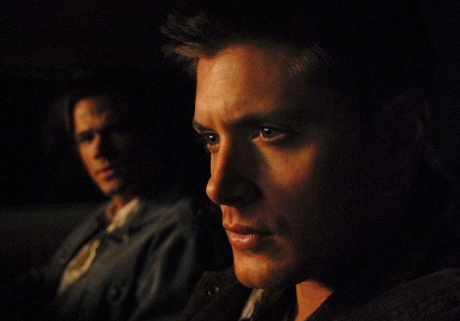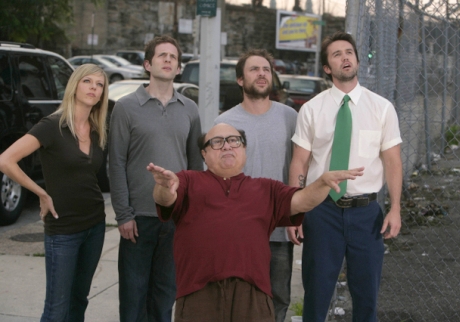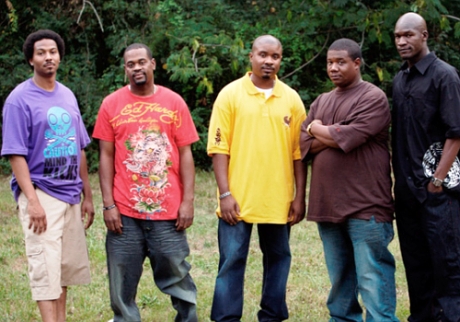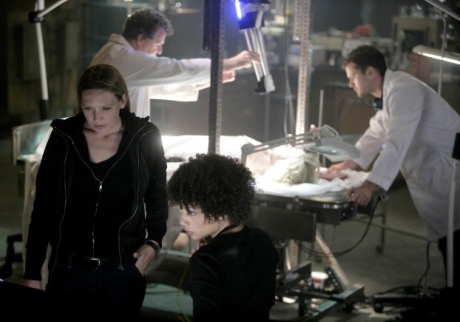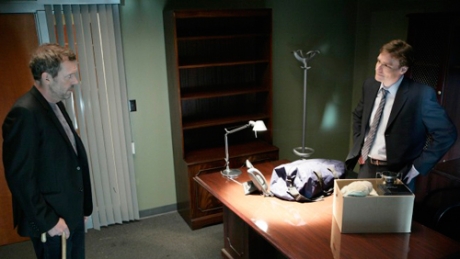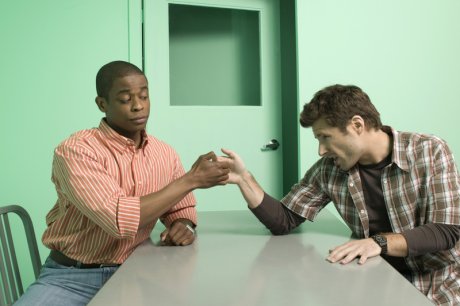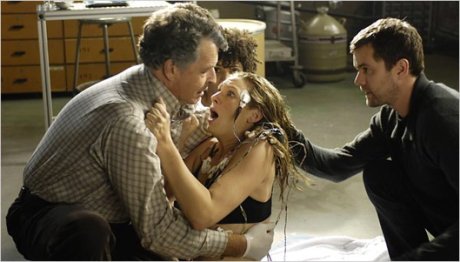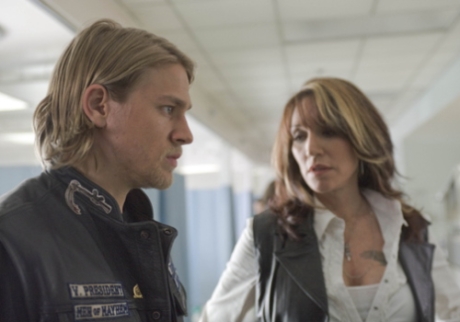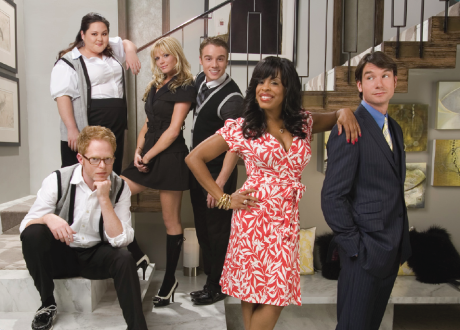Susannah and I have been kicking back at the Emmys for a good long time now. We’ve wept. We’ve wailed. We’ve gnashed our teeth. Personally, I’ve worn sackcloth and ashes, but that’s just my general fashion aesthetic.
Part of the issue is that we can’t put our finger on what the problem is–something’s wrong (really, Academy–Entourage? Really?), but what is it? We’re inclined to blame the Emmy categories–is Pushing Daisies really the same kind of beast as Two and a Half Men? Should Dirty Sexy Money–or Boston Legal, for that matter–really be considered a drama? We’re embarrassed to admit, however, that every new categorization scheme we tried went exactly nowhere.
We considered doing away with “Drama” and “Comedy” and going instead with “Half-hour”/”Hour” or “Single-camera”/”Multi-camera”, both of which are already used in the technical and animated categories. In today’s television landscape, however, that left us with a couple of strong contenders and a couple we could argue about in the half-hour or mutli-camera categories while overloading the hour/single-camera even more than the current drama category already is. We toyed with the idea of honoring more actors by creating lead, supporting, and ensemble categories. These might allow for, say, Hugh Laurie (lead), Robert Sean Leonard (supporting), and Omar Epps (ensemble) or Steve Carell (lead), Rainn Wilson (supporting), and Ed Helms (ensemble) to be nominated for the same show, or for the large ensemble casts of, say, Lost or Friday Night Lights to be considered separately from shows that focus on true leads, like House or Life. The details necessary to make that work, however (“if the character appears on-screen for less than 30% of the broadcast…”), both felt arbitrary and were, frankly, nearly impossible to hammer out. We played with the possibility that there just aren’t enough slots available to honor all of the great performances out there, so we tried adding and dividing up categories differently–“Classic Sitcom”! “Workplace Drama”! “Speculative Fiction”! “Human Interest (read: Soap Opera”)! Each of those seemed just as arbitrary as “Comedy” and “Drama,” though–is Grey’s Anatomy a workplace drama or a human interest show? You could argue either category for Mad Men. We were stumped.
And then it occurred to us: maybe the categories are the problem–and maybe that means there shouldn’t be any categories at all. This was a strangely liberating idea. We kept the sex split, both because it seems less arbitrary than the above and because we feared our lists would be swamped with male roles otherwise (try filling out the female comedy roles under the traditional categories–brutal). We limited ourselves to people on the official Emmy ballot, which meant excluding favorites because of production-based eligibility problems (goodbye, British-based Doctor Who crew), because of genre (sorry, Venture Brothers–we’ll catch you next time), and because they simply didn’t appear on the ballot for reasons beyond our understanding (who dropped the ball on submitting Dan Byrd from Aliens in America?). We began with a list of 40 actors of each sex, then narrowed the list to 30 and ranked them. By assigning points to those rankings, we were able to compare and combine our lists to create a category-less Bacon Emmys. After complaining that there just weren’t enough spots to honor all of the excellent performances out there, we were pretty surprised to find that in the end we shared 21 ranked male actors and 21 ranked female actors–with one tie in the Lead Actor in a Drama category leading to 21 official male Emmy nominees in the “major” acting categories this year, that means our numbers are pretty much right on the real numbers. Some other patterns surprised us, too:
Male actors (in alphabetical order):
- Alec Baldwin, 30 Rock
- Steve Carell, The Office
- Kyle Chandler, Friday Night Lights
- Gaius Charles, Friday Night Lights
- Henry Ian Cusick, Lost
- Glenn Fitzgerald, Dirty Sexy Money
- Neil Patrick Harris, How I Met Your Mother
- Ed Helms, The Office
- Michael Hogan, Battlestar Galactica
- Hugh Laurie, House
- Robert Sean Leonard, House
- Zachary Levi, Chuck
- Damian Lewis, Life
- Zeljko Ivanek, Damages
- Jack McBrayer, 30 Rock
- Chi McBride, Pushing Daisies
- Lee Pace, Pushing Daisies
- Wendell Pierce, The Wire
- Andre Royo, The Wire
- Michael K. Williams, The Wire
- Ray Wise, Reaper
Female actors (in alphabetical order):
- Julie Benz, Dexter
- Connie Britton, Friday Night Lights
- Rose Byrne, Damages
- Kristin Chenoweth, Pushing Daisies
- Glenn Close, Damages
- Tina Fey, 30 Rock
- Anna Friel, Pushing Daisies
- Ellen Greene, Pushing Daisies
- Christina Hendricks, Mad Men
- Holly Hunter, Saving Grace
- January Jones, Mad Men
- Angela Kinsey, The Office
- Swoosie Kurtz, Pushing Daisies
- Mary McDonnell, Battlestar Galactica
- Elizabeth Mitchell, Lost
- Adrianne Palicki, Friday Night Lights
- Amy Pietz, Aliens in America
- Jamie Pressley, My Name Is Earl
- Sarah Shahi, Life
- Sonja Sohn, The Wire
- Natalie Zea, Dirty Sexy Money
For the record, Susannah’s top two ranked actors I didn’t list were Lost‘s Michael Emerson and FNL‘s Jesse Plemmons, while my top ranked she didn’t list were Breaking Bad‘s Bryan Cranston and It’s Always Sunny in Philadelphia‘s Charlie Day. For the women, her top two ranked picks I didn’t list were The Riches‘ Minnie Driver and Lost‘s Evangeline Lily, while my top picks she didn’t list were Tricia Helfer of Battlestar Galactica and Sunny‘s Kaitlin Olson.
These 42 actors represent 17 shows, which isn’t as many as the real nominees (24 shows). So maybe the Emmys do a better job of spreading the wealth than we would. On the other hand, they spread that wealth by nominating Charlie Sheen and Mariska Hargitay, and…yeah, we’re not going to apologize for not spreading the wealth quite that far. In fact, TV Bacon and the Academy agree on slightly fewer than 25% of the nominees (ten out of 41/42). It’s a supporting-heavy list, although that’s slightly skewed by self-submissions we’d place elsewhere (in what universe is Connie Britton supporting?)–that may reflect the current popularity of the ensemble shows we had such a hard time categorizing. It’s a very, very white list, especially for the women. Thank goodness for The Wire–if we remove their four candidates, 35 out of 38 of the remaining nominees are white. We’re still doing a little better than the real Emmys, who, including The Wire (from which they chose zero nominees), had four minority nominees out of 41 total. While we’ve both had America Ferrera and Edward James Olmos on our lists in the past, even including them wouldn’t hide the whitewash that is American television in 2008.
Perhaps most interesting, however, is that after all our complaining about the traditional categories–and we’re still plenty irked about several exclusions among the real nominees–it wouldn’t take us long to declare winners in each of those. Adding together our rankings to create a “winner,” we’d have to go exactly four names down our list of female actors to fill the four traditional categories, as our top four were Connie Britton (supporting actress in a drama), Glenn Close (lead actress in a drama), Kristin Chenoweth (supporting actress in a comedy), and Anna Friel (lead actress in a comedy). The pattern for the men isn’t nearly so clear, since we’d have to go five whole places down our list to declare winners in the four traditional categories: Andre Royo (supporting actor in a drama), Lee Pace (lead actor in a comedy), Alec Baldwin (lead actor in a comedy), Kyle Chandler (lead actor in a drama), and Jack McBrayer (supporting actor in a comedy). If we’d hewn even more strictly to the Emmy rules and judged a single episode the actors submitted, Baldwin’s tour de force journey through 70s sitcoms might well have pushed him over the top. So after all our complaining and rearranging–are the categories really the problem after all?
What do you think? How would you have rearranged the Emmy categories? Who do you think was robbed? Are you coming after me with pitchforks because it was my list that kept John Krasinski out? Will the Emmys ever get it right?

